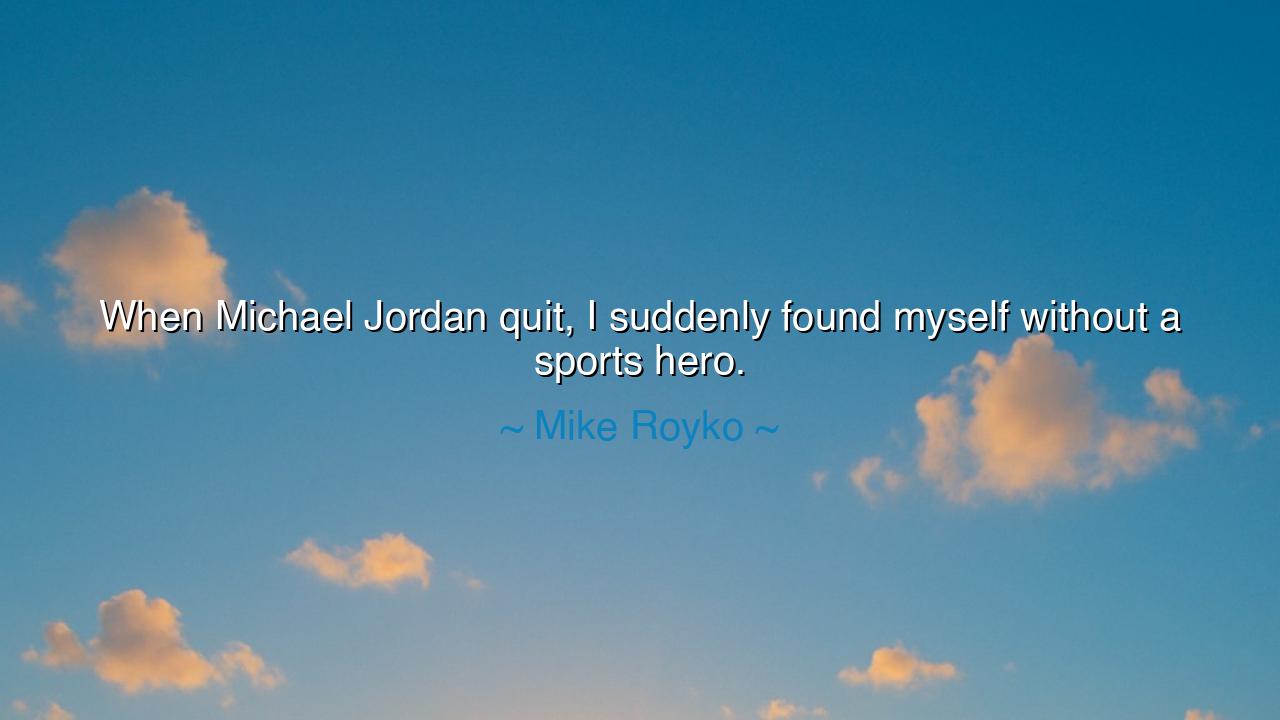
When Michael Jordan quit, I suddenly found myself without a






In the pursuit of greatness, we often find ourselves drawn to figures who embody the qualities we most admire—strength, skill, perseverance, and grace. These individuals, these heroes, become beacons of light, guiding us through the storms of our own lives. Mike Royko, a voice of reflection and insight, once spoke of the profound impact that such a hero had on his life: "When Michael Jordan quit, I suddenly found myself without a sports hero." In these words, we hear the deep sorrow of a man who, like so many, found his inspiration in the fierce drive of another—a hero who could soar above the rest, whose every action seemed to embody the very essence of what it meant to strive for excellence.
Jordan, the basketball legend, was not merely a player; he was a symbol. His relentless work ethic, his ability to rise above adversity, and his unyielding desire to win became a part of the fabric of an entire generation. For Royko, as for countless others, Jordan was the embodiment of triumph over the ordinary. When Jordan took his first step away from the game, the world seemed to lose something of its brightness. For in the absence of such a hero, what remains? The loss of a hero is not merely the loss of a person, but the loss of a vision, a dream to which one can aspire. It is as though the light that once illuminated the path is suddenly extinguished.
This loss, the absence of a figure to look up to, is an experience that echoes through the ages. The Greeks, in their reverence for heroes, would tell tales of warriors like Achilles and Odysseus, whose actions on the battlefield were more than feats of strength; they were ideals, templates for how one could live, how one could overcome the greatest trials. When these heroes were no longer present, when they fell or departed, the world seemed emptier, as if the very fabric of society had lost something vital. The stories of such heroes were not just tales of battles and victories, but blueprints for living a life of courage, of striving toward something greater.
In the same way, Jordan’s departure was not simply the end of a sports career—it was the loss of a living example of excellence. The story of his rise, his dominance on the court, his willingness to push through pain, to defy odds, and to challenge what was thought possible, was a guiding star for many. Without that star, Royko’s world, much like ours, felt less certain, as if the map of greatness had been torn. And yet, even in this moment of loss, there lies an opportunity—a reminder that the true hero is not only one who stands before us, but one who exists within.
Consider the example of Alexander the Great, whose own untimely death left the world in mourning. His vision of an empire that stretched across continents, his unyielding drive to conquer, to learn, and to expand his horizons, became a symbol for generations to come. When he passed, his empire fractured, and his followers were left searching for new leadership. Yet, in the wake of his departure, the seeds of his greatness were planted in others, and the world continued to move forward. The hero had left, but the ideals he championed lived on in those who followed.
And so it is with us. The loss of a hero does not mark the end of greatness—it marks the beginning of a new chapter. We must not look to others solely for inspiration, but find within ourselves the qualities that made our heroes great. We carry their lessons, their example, and we breathe new life into them with our own actions. Michael Jordan may have stepped away from the court, but the values he embodied—hard work, resilience, and excellence—are not confined to the basketball court. They live on in us all, if we choose to embrace them.
The lesson, then, is this: heroes come and go, but their influence never truly fades. When you find yourself without a hero, do not despair, for the qualities you admire in them are not unique to their person, but universal in all who strive for greatness. Seek not to find another to follow, but to embody the virtues of the heroes you admire in your own life. In this way, you will not only carry their legacy forward, but you will become a hero in your own right, guiding others to the same heights you once admired.






AAdministratorAdministrator
Welcome, honored guests. Please leave a comment, we will respond soon